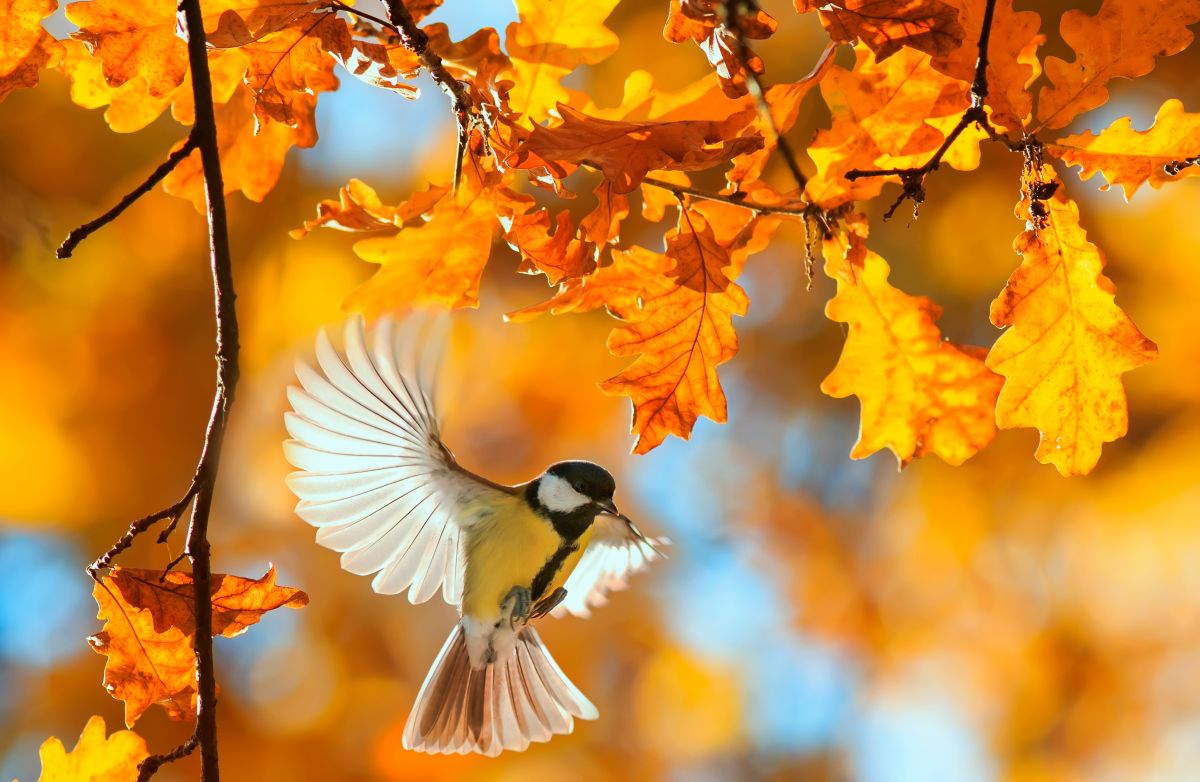The power of nature: listening to birdsong for your physical and mental health
October 10, 2025

As summer fades and the days grow shorter, many of us feel a twinge of sadness, but autumn is anything but gloomy. Trees become colourful displays of gold and crimson, whilst hedgerows become laden with wild fruits, offering a feast for both wildlife and foragers. Beyond its beauty, autumn also heralds the return of migratory birds who fill the air with their songs, providing benefits for human physical and mental wellbeing.
Birdsong holds a special place in our connection to nature. Whether you're in a bustling city or a quiet rural area, the sound of birds can be a familiar and uplifting presence. In autumn, listen out for the sounds of migratory birds arriving for winter. Species such as redwing, brambling, snow bunting, and fieldfare begin arriving in early October from eastern Europe. The brambling, in particular, is known for its distinctive nasal call and can be spotted in gardens, easily recognised by its orange-red breast.
Beyond its beautiful sound, birdsong has been linked to long-term improvements in mental wellbeing, including reduced anxiety, depression, and physiological stress. A study found that the beneficial effects of encounters with birds were felt in both people with depression and those without a mental health disorder, whilst a poll by the RSPB reported that 91% of adults felt that seeing birds and hearing birdsong positively impacted their mental health.

During the Covid-19 pandemic, many of us rediscovered the value of spending time outdoors. In fact, according to a government survey, 45% of adults reported spending more time outside than before the pandemic, and 81% said that being in nature made them feel happier. The benefits of spending time in natural environments are well-documented, ranging from enhanced cognitive function to improved mood and emotional resilience. One study found that just two hours a week in nature can unlock these benefits, while another revealed that a 90-minute walk can reduce activity in brain regions associated with mental illness. These findings have helped shape a growing therapeutic approach known as ecotherapy, which encourages nature-based interventions to support mental and physical health.
Luckily, nature can be enjoyed in lots of different ways from gardening, watching a sunrise or sunset, or simply going on a walk. Birdsong is freely available and can be enjoyed from your home, however research suggests that pairing birdsong with time spent in nature amplifies its benefits. Actively engaging with nature - such as noticing and identifying birds - can further enhance feelings of connectedness and reduce anxiety. You can use our Songbird A-Z to help you to identify birds by sight – each bird profile will show you the visual differences between males, females and juveniles. Alternatively, if you're curious to identify birds based on their song, the Merlin app is a fantastic starting point. Simply record birdsong, and the app will help identify the species.
Spending just 30 minutes observing and listening to birds in your garden or local green space can significantly boost your wellbeing. So, this autumn, take a moment to step outside, listen closely, and reconnect with the natural world. Your mind and body will thank you.
References
Big Garden Birdwatch (2023) RSPB. Access: https://www.rspb.org.uk/whats-happening/big-garden-birdwatch
Bratman, G. et al. (2015) Nature experience reduces rumination and subgenual prefrontal cortex activation. Psychological and Cognitive Sciences, 112(28), 8567-9572
Hammoud, R. et al. (2022) Smartphone-based ecological momentary assessment reveals mental health benefits of birdlife. Scientific Reports, 12(17589)
People and Nature Survey (2022) Natural England. Access: https://www.gov.uk/government/collections/people-and-nature-survey-for-england
Rueff, M. and Reese, G. (2023) Depression and anxiety: A systematic review on comparing ecotherapy with cognitive behavioural therapy. Journal of Environmental Psychology, 90(102097)
Schertz, K. and Berman, M. (2019) Understanding Nature and Its Cognitive Benefits. Current Directions in Psychological Science, 28(5)
Stobbe, E. et al. (2022) Birdsongs alleviate anxiety and paranoia in healthy participants. Scientific Reports, 12(1),16414
Vanhöfen, J. et al. (2025) Effects of nature experience on mental well-being and physiological stress parameters in an experimental bird walk setting – the role of bird song. Landscape and Urban Planning, 263
White, M. et al. (2019) Spending at least 120 minutes a week in nature is associated with good health and wellbeing. Scientific Reports, 9(7730)
White, M. et al. (2023) The Joy of birds: the effect of rating for joy or counting garden bird species on wellbeing, anxiety, and nature connection. Urban Ecosystems, 26, 755-765
The SongBird Survival Team
If you are a scientist and would like to shine a light on your recent research covering songbirds here in the UK, then let us know! As a supporter of our charity, if you have ideas for blog posts you would like to see and topics you would like us to cover on #theSBSblog, please contact us at dawn-chorus@songbird-survival.org.uk or our Scientific Research and Impact Manager at emma@songbird-survival.org.uk.
We need your help to fund our crucial independent research and work.
Join our community and receive our exclusive membership benefits.
Receive our monthly e-news and regular updates